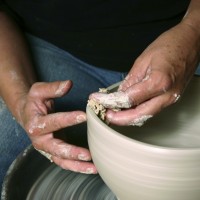Part of our BE-ing (that extends far beyond our doing) is that we were Created to BE Blessed. I don’t know about you, but I don’t wake up every day thinking that God is looking to bless me from the moment the sun rises until the sun rises the following day. I’m too busy? Too forgetful, too preoccupied? Blessing has been so much a part of my life that it has become mundane? I don’t know. I guess there are ways in which I’m kind of an ingrate.
Blessing has been God’s way since creation. After God created Adam and Eve, He blessed them. Not because Adam and Eve had done anything yet to make God decide to reward them, but because our God is generous and loves to bless.
I saw the evening news about the tornadoes that ripped through Joplin, Missouri. Someone had painted a sign that said, “God is With Us.”
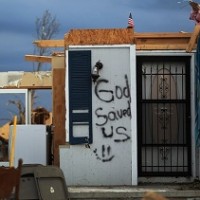 Someone saw that God was blessing even in the midst of tragedy. This doesn’t come naturally for me. I have to work hard to cultivate that kind of attitude.
Someone saw that God was blessing even in the midst of tragedy. This doesn’t come naturally for me. I have to work hard to cultivate that kind of attitude.
Maybe it’s just the flip side of the sovereignty of God, God gets the credit for any blessings that come my way…and God gets the blame for the things that happen that cause me to question, “Where is God in all of this?”
“God is With Us.”
Or this photo, “God Saved Us.”
Blessings in tragedy.
In every tragedy, blessing is still there.
- Cancer. Yet God is with us and is blessing us.
- Tornadoes. Yet God is with us and is blessing us.
- Death of loved ones. Yet God is with us and blessing us.
- Tsunami in Japan, Earthquake in Haiti, Unrest in the Middle East–we cannot forget these. Yet God is there…blessing still.
Sounds a lot like the prophet Jeremiah in Lamentations:
I remember my affliction and my wandering, the bitterness and the gall. I well remember them, and my soul is downcast within me. Yet this I call to mind and therefore I have hope: Because of the LORD’s great love we are not consumed, for his compassions never fail. They are new every morning; great is your faithfulness. I say to myself, “The LORD is my portion; therefore I will wait for him.” The LORD is good to those whose hope is in him, to the one who seeks him; it is good to wait quietly for the salvation of the LORD. It is good for a man to bear the yoke while he is young. Let him sit alone in silence, for the LORD has laid it on him. Let him bury his face in the dust– there may yet be hope. Let him offer his cheek to one who would strike him, and let him be filled with disgrace. For men are not cast off by the Lord forever. Though he brings grief, he will show compassion, so great is his unfailing love. (Lamentations 3:19-32)
Look at the blessings of God in this passage: the LORD’s great love, His compassions never fail, His great faithfulness, His goodness, His salvation, His hope!
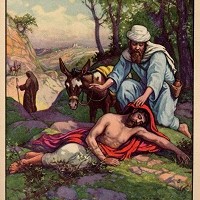 Love the Lord your God…and your neighbor as yourself. Being in community and FOR one another may involve risking any of these:
Love the Lord your God…and your neighbor as yourself. Being in community and FOR one another may involve risking any of these: This was brought home to me in a strange way. My husband and I have a dog named Harley—a smooth haired fox terrier. He attracts a lot of attention, particularly from children. Last evening, Harley was taking us for a walk when a little boy ran up and asked if he could pet our dog. The little boy smiled when I said “Yes” and then he looked at my face with the bandage from my surgery and asked, “What’s that?” I immediately thought of the medical answer and decided that wouldn’t be nearly as informative or age appropriate as the answer I gave him: “I had an owie on my face and so the doctor took it away.” The little boy said “Oh, that’s good.” While he was petting Harley, two little girls came running up to see Harley too, and one of them spoke for the pair and asked “What happened?” and they both pointed to their faces corresponding to where my bandage is. I gave them the same answer and they said, “Oh. OK.” After this episode, I talked with my husband about how I ran into a woman from church while I was at the store earlier and she also asked me “What happened?” I’m sure everyone I encountered was wondering about this prominent bandage, but only she—a friend—asked.
This was brought home to me in a strange way. My husband and I have a dog named Harley—a smooth haired fox terrier. He attracts a lot of attention, particularly from children. Last evening, Harley was taking us for a walk when a little boy ran up and asked if he could pet our dog. The little boy smiled when I said “Yes” and then he looked at my face with the bandage from my surgery and asked, “What’s that?” I immediately thought of the medical answer and decided that wouldn’t be nearly as informative or age appropriate as the answer I gave him: “I had an owie on my face and so the doctor took it away.” The little boy said “Oh, that’s good.” While he was petting Harley, two little girls came running up to see Harley too, and one of them spoke for the pair and asked “What happened?” and they both pointed to their faces corresponding to where my bandage is. I gave them the same answer and they said, “Oh. OK.” After this episode, I talked with my husband about how I ran into a woman from church while I was at the store earlier and she also asked me “What happened?” I’m sure everyone I encountered was wondering about this prominent bandage, but only she—a friend—asked. 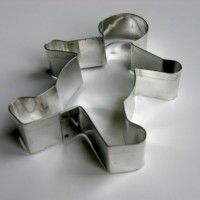 Isn’t it wonderful that when God set out to create human beings, that He made us each to be individuals? No cookie cutter, mass-produced, dime-a-dozen clones. Each one of us is handcrafted.
Isn’t it wonderful that when God set out to create human beings, that He made us each to be individuals? No cookie cutter, mass-produced, dime-a-dozen clones. Each one of us is handcrafted.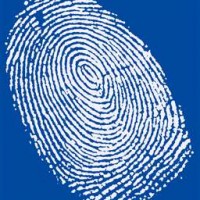 I’ve been thinking about this a lot. As of this writing, I’m recovering from having a basal cell carcinoma lesion removed from my face. Once the pain and swelling go away, there will be a scar (hopefully it will not be too noticeable). But for Christians, these scars are our stigmata—the marks of life—as we pick up our cross and follow Christ on a journey of BE-ing in a fallen world.
I’ve been thinking about this a lot. As of this writing, I’m recovering from having a basal cell carcinoma lesion removed from my face. Once the pain and swelling go away, there will be a scar (hopefully it will not be too noticeable). But for Christians, these scars are our stigmata—the marks of life—as we pick up our cross and follow Christ on a journey of BE-ing in a fallen world. 
